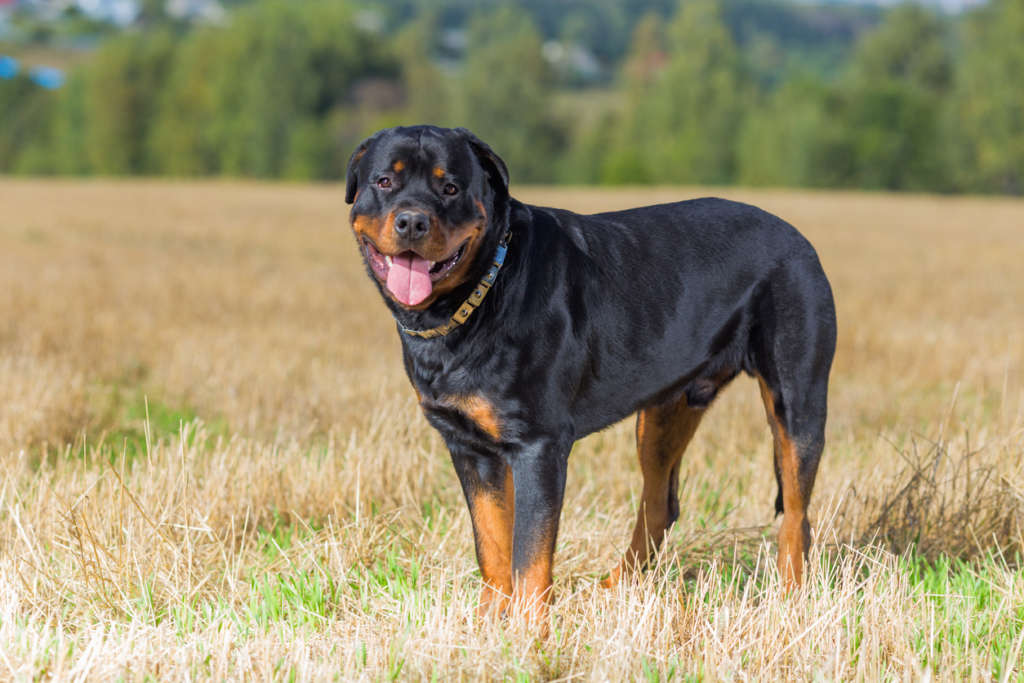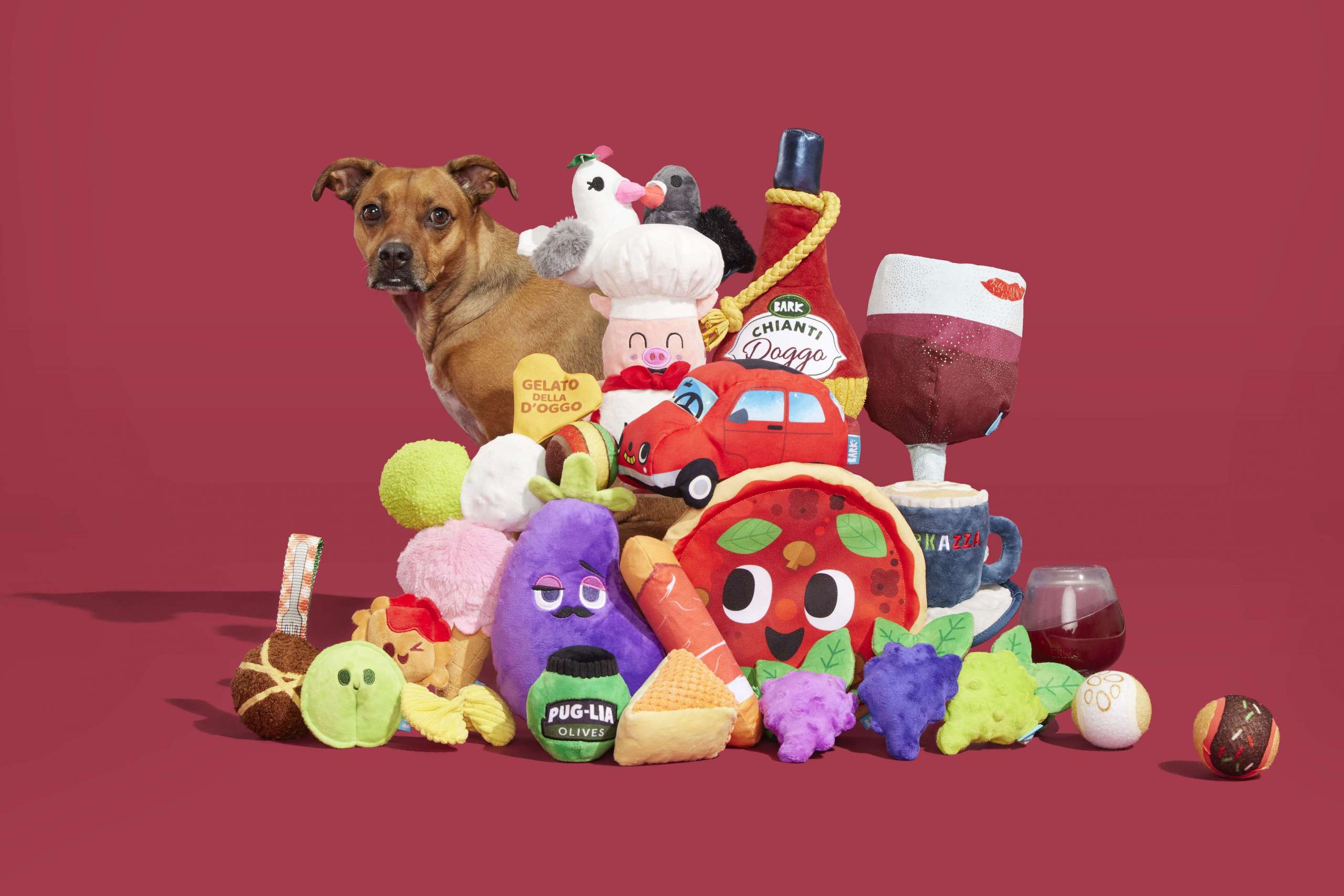Standing strong and towering above most other breeds, the Rottweiler is a hard-working, blue-collar tail-wagger. As loyal as they are lovable, these purebreds are a real treat to get to know.


Rotties have a soft side despite their hulking stature, and they know when to show it off. These are big, bumbling brutes during downtime and alert, assertive guardians when something seems off. A Rottweiler may not be the perfect match for every pup-seeking person, but those willing to commit to a huge, high-spirited breed will fall head over heels.
Breed Overview
Rottweilers Are Also Known As…
Rott. Rottie. *Insert rough ‘n’ tough name here.* The largest lap dog ever.
What Is The History Of The Rottweiler?
As far as canine chroniclers can tell, the earliest mention of a Rottweiler-type dog was around 2,000 years ago during the Roman empire’s conquest of what is now Germany. At the time, the Rottie would have been a herding dog, bringing the Romans’ roving herds of livestock over the Alps with them. This is a testament that the Rottweiler is a working dog through and through.
As for the name Rottweiler, one look at a map of southern Germany tells you everything you need to know. The breed’s title comes from the town of Rottweil, where these strapping dogs worked for butchers (hence the name Rottweiler Metzgerhund, which translates to butcher’s dog) and cattle dealers, continuing the Roman-era tradition of herding and guarding sheep and cows.
When cattle driving via canine fell out of fashion, the German Rottweiler had to pivot to a new career. Similar to the German shepherd, instead of guarding animals, Rotties started watching over people, most notably as police dogs during the World Wars. The Rottweiler was admitted to the American Kennel Club in 1931, listed under the Studbook.
Today, the Rottweiler dog is a well-known superstar, taking the eighth spot on a 2021 list of America’s most popular dog breeds.


How Big Do Rottweilers Get?
A male Rottweiler is slightly larger than a female Rottweiler. However, a female Rottweiler can be faster than her male counterpart due to her size. That being said, the average Rottweiler is:
Height: 22–27 inches
Weight: 80–135 pounds
How Long Do Rottweilers (Generally) Live?
If you have experience with large breeds, you know the deal: the big dogs have shorter lifespans than itty-bitty dachshunds and Shih Tzus. The life expectancy for a healthy Rottweiler dog is 9–11 years, with a bit of wiggle room on either side.
What Is A Rottweiler’s Temperament & Personality Like?
Like pit bulls and Dobermans, Rottweilers are subject to unsavory rumors. Whispers here and there may warn you that Rotties can be dominant or dangerous dogs. However, as with all stereotypes, the truth is more nuanced.
Of course, it’s possible to train a Rottweiler to be a canine combatant. Because of their smarts and strength, Rotts make excellent police pups and guard dogs. But they don’t have to be ferocious furballs. In fact, Rottweilers are natural lovers, not fighters. It’s about nurture, not nature.
When raised in a family setting, Rotties are the ultimate cuddly companions. They bark only to notify, love a rousing game of chase-the-ball and want nothing more than to earn the love of their humans.
Good With Kids? Cats? Dogs?
When it comes to smaller humans, Rottweilers need a bit of a primer. They love to show their affection, but sometimes, 130 pounds of love hurtling toward a toddler is too much. If you intend to bring Rocko around children, it’s best to introduce him to little ones as early as possible so he can learn his manners.
With kitties as much as with kiddies, the early years are key. Adult Rottweilers without ample feline experience may see a cat as an amuse-bouche. To avoid any unwelcome chase scenes, you’ll want to give your Rottie a taste of cat companionship early on (and please, not a literal taste).
As for other dogs, Rottweilers see members of their species the same way they see most others: a potential friend to be approached with caution. Rotties are notoriously protective, and if their protective instinct outweighs their desire for a new homie, you may find yourself gripping the leash extra tight.
With social situations and Rottweilers, here’s the bottom line: if you’re ever unsure (or even if you’re almost sure), supervise your dog throughout any interaction with strangers—be they two- or four-legged.


Do Rottweilers Need A Lot Of Exercise?
Rotties aren’t over-the-top rambunctious, but they’re still rather energetic. After all, they have to keep their sturdy shoulders in shape—those rippling muscles don’t sustain themselves!
Rottweilers love to hit the gym (read: dog park) for a few sets of deadlifts (read: running after a Frisbee). With that said, they’re equally happy to laze around on a king-sized dog bed (read: human bed).
Even more than physical exercise, Rottweilers need regular tests of mental fortitude. Although their days working in the fields are largely over, many Rotties still crave a purpose in life. Giving them a task or two throughout the day—even something as simple as guarding your slippers—will ensure your canine has a productive (rather than destructive) outlet for their energy.
Are Rottweilers Hard To Train?
As evidenced by their many job titles over the years, Rottweilers are born to take orders. Whether you’re looking for a guard dog, a shepherd, or a shake-a-paw expert, you can’t go wrong with a Rottie.
In many ways, Rottweilers are one of the best candidates for training. They’re super smart, attentive, and eager to please. Put it all together, and you have a master listener in the making. Like most breeds, it’s better to start training while it is still a Rottweiler puppy.
In some scenarios, Rotties can be a little stubborn. Learn to put your foot down and start obedience training ASAP, and you shouldn’t have any issues.


Do Rottweilers Have Health Issues?
Like many large dogs, Rottweilers are unfortunately susceptible to a handful of health conditions. Some of the more notable problems include:
- Joint pains and arthritis – With long limbs and burly bodies, Rottweilers can be prone to hip and elbow dysplasia, as well as osteochondritis dissecans—a cartilage problem in the knees, shoulders, and ankles.
- Heart problems – Specifically, this dog breed is more prone to subaortic stenosis (SAS), which can cause fainting and heart murmurs.
- Cancers – For whatever reason, the Rottweiler breed seems to be more at risk for lymphoma and bone cancer.
However, don’t run from the Rottie! Many of these issues are avoidable or manageable. To stay on top of your hound’s health, take them in for tests at a young age. Vets can often catch signs and symptoms early, and the sooner you know about an affliction, the sooner you can take action.
Do Rottweilers Need To Be Groomed?
Far from a high-maintenance diva, your Rottweiler will probably need a monthly nail clipping and a semi-regular ear cleaning. Both of these tasks can be handled by a groomer or at home with the right supplies and research.
If you were thinking more along the lines of a haircut and hot water bath, Rotties can skip the spa day. Their fur isn’t as fussy to maintain compared to Goldendoodles or Shiba Inu dogs. Because they shed, there’s no need for the ol’ scissors and shaver treatment. Rottweilers are moderate year-round shedders, with extra seasonal shedding in the spring and fall.
Their short, smooth coats aren’t particularly prone to attracting dirt, so a bi-weekly brushing is more than enough to keep them prim and proper.


How Much Does It Cost To Care For A Rottweiler?
Estimating the cost of dog ownership is never easy, but you should expect to spend at least $1,600+ per year caring for your Rottie.
How Much Dog Food Should A Rottweiler Eat?
Huge dog = humongous appetite. Rottweiler puppies usually need 1–3 cups of kibble per day, while adults can eat as many as 5–8 cups. All in, you can easily spend upwards of $100 per month on food.
To save on food without skimping on nutrients, try a customized meal plan from BARK Eats! With a nutritionist-developed formula made specifically for Rottweilers, high-quality food is never far away. In fact, it’s right on your doorstep every month. Get 50% off your first month!
Routine Vet Care (Healthy Dog)
No matter their condition, all dogs need routine trips to the vet—Rotties are no exception. If you pop into the animal clinic every six months, your yearly vet bill may look something like this:
- Veterinarian fees ($100–130)
- Vaccines ($100–300)
- Heartworm tests ($40–120)
- Medications and other expenses ($100)
Preventative Medications For Rottweilers
Aside from flea and tick medications (around $120/year), you can invest in your Rottweiler’s health by giving them glucosamine chondroitin. This supplement promotes healthy joints, easing pain and staving off animal arthritis in the long run. Talk to your vet about giving your Rottie glucosamine treats—the $100/year cost is usually well worth it.


Rottweiler Grooming
Despite the limited pampering necessary, Rotties can be big spenders at the salon because of their size. Depending on where you live, you can expect to spend about $100 each time you hit up the groomer.
Toys, Treats, Beds, & Accessories
Don’t skimp on the essentials (and don’t forget to factor these small, miscellaneous costs into your budget). Here’s a rough rundown of what you might spend keeping your Rottweiler comfy:
- Toys ($120)
- Treats ($80/year)
- Large dog bed ($60–120)
- Collar and heavy-duty leash (~$40)
- Nail clippers ($12)
Seeking VIP treatment for you and your pup? Try BarkBox. $23/month brings 2 toys, 2 treat bags, and a tasty chew right to your door. For a Rottweiler-proof assortment, there’s the $29/month Super Chewer subscription. Every month, you’ll receive 2 durable dog toys, 2 full-size bags of treats, and 2 (count ‘em, TWO) meaty chews. DOUBLE YOUR FIRST BOX FREE!
Sources:
National Rottweiler Council. About the Rottweiler. https://www.nationalRottweilercouncil.com/Rottweiler-history.html
CNN. Labrador retriever tops American Kennel Club’s annual list of most popular dog breeds. https://www.cnn.com/2022/03/20/us/american-kennel-club-most-popular-dogs-trnd/index.html
The People’s Dispensary for Sick Animals. Rottweiler. https://www.pdsa.org.uk/pet-help-and-advice/looking-after-your-pet/puppies-dogs/large-dogs/Rottweiler





